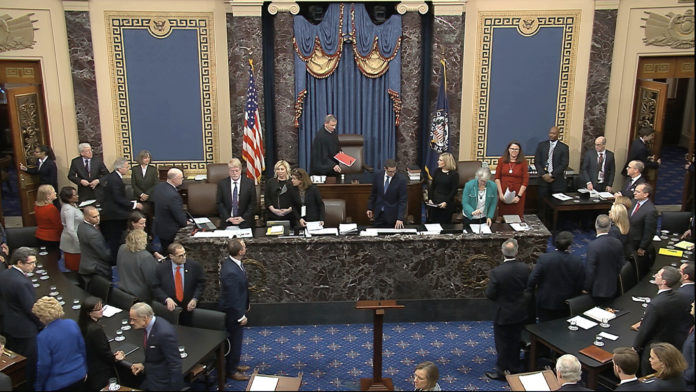
By Matthew Muir | Staff Writer
The Senate acquitted President Donald Trump of both articles of impeachment Wednesday concluding the impeachment saga in the same partisan divide with which it started. The final tallies of 52-48 on article one and 53-47 on article two in favor of acquittal fell well-short of the two-thirds majority needed to convict the president.
Sen. Mitt Romney (R) of Utah became the first Republican to break with the party on conviction when he announced his intent to vote in favor of removing Trump from office on the first article, abuse of power. In the end, he would be the only Senate Republican to do so, a result the Senator said he expected.
“I acknowledge that my verdict will not remove the president from office,” Romney said. “The results of this Senate court will in fact be appealed to a higher court: the judgement of the American people.”
The president’s acquittal became expected after the Senate voted against allowing new evidence and witness testimony Friday. Partisanship became a hallmark of the impeachment saga, as only small handful of representatives defected from their parties throughout the entire process. The 48 Democratic senators were joined only by Republican Sens. Romney and Susan Collins of Maine, falling just shy of the majority needed.
Republicans consistently argued impeachment was an unjustified and politically-motivated act by Democrats. Trump repeatedly said the impeachment process was a “witch hunt” and a “hoax” even before Speaker of the house Nancy Pelosi announced a formal inquiry. In a statement immediately preceding the trial’s final vote, Senate Majority Leader Mitch McConnell (R) of Kentucky accused Democratic politicians of using impeachment as a weapon of “first resort” in an attempt to overturn the 2016 election.
“Normally when a party loses an election it accepts defeat, it reflects and retools, but not this time,” McConnell said.
Senate Minority Leader Chuck Schumer (D) of New York instead said impeachment was a protection against “the worst conduct a president could engage in.”
“For an American president to deliberately solicit such a thing, to blackmail a foreign country into helping win an election, is unforgivable,” Schumer said. “Now does this rise to the level of impeachable offense? Of course it does.”
Trump became only the third U.S. President to be impeached when the House of Representatives voted to impeach him on Dec. 18 in another mostly party-line vote. The House charged Trump with two articles of impeachment, abuse of power and obstruction of Congress, stemming from a July 2019 phone conversation with Ukrainian President Volodymyr Zelensky.
In the call, Trump tried to pressure Zelensky into opening an investigation into the business dealings of Democratic presidential candidate Joe Biden and his son Hunter in Ukraine, using the reinstatement of military aid he suspended as leverage. Much debate focused on whether the actions were impeachable, with representatives such as Sen. Rob Portman (R) of Ohio saying the conduct was wrong but not impeachable.





